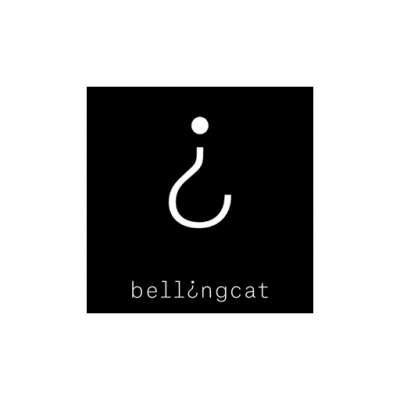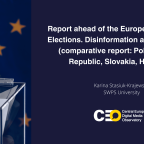About CEDMO
The Central European Digital Media Observatory (CEDMO), as an independent non-partisan multidisciplinary hub, aims to identify, research and prioritise the most critical sources and causes of information disorders in Central Europe (mainly the Czech Republic, Slovakia and Poland). This international consortium was created to propose a set of short and longer-term actions, as well as recommendations to help civil society, public institutions and the private sector respond to the declining trust in key institutions and help society to resist the effect of increasing exposure to mis- and disinformation.
By interacting and coordinating with European Digital Media Observatory (EDMO) and other regional EDMO hubs in EU, CEDMO will contribute to curbing threats posed by information disorders, including disenchantment with the democratic processes, and discord in civil society in Europe, and to building community and nation-wide resilience while protecting information ecosystems.
About CEDMO
The Central European Digital Media Observatory (CEDMO), as an independent non-partisan multidisciplinary hub, aims to identify, research and prioritise the most critical sources and causes of information disorders in Central Europe (mainly the Czech Republic, Slovakia and Poland). This international consortium was created to propose a set of short and longer-term actions, as well as recommendations to help civil society, public institutions and the private sector respond to the declining trust in key institutions and help society to resist the effect of increasing exposure to mis- and disinformation.
Our Partners
About CEDMO
The Central European Digital Media Observatory (CEDMO), as an independent non-partisan multidisciplinary hub, aims to identify, research and prioritise the most critical sources and causes of information disorders in Central Europe (mainly the Czech Republic, Slovakia and Poland). This international consortium was created to propose a set of short and longer-term actions, as well as recommendations to help civil society, public institutions and the private sector respond to the declining trust in key institutions and help society to resist the effect of increasing exposure to mis- and disinformation.
Our Partners
“Media: One of #Zelensky’s bodyguards brought his chief’s visit to the #US to a vibrant conclusion starting a fight in a bar not far from the UN office because the visitors didn’t want to shout out after him ‘Glory to Ukraine,'” says a September 26, 2023 X post shared by the Russian embassy in South Africa.
“We will never impose unnecessary and heavy-handed measures on you, the British people. We will still meet our international commitments and hit Net Zero by 2050,” Sunak said in a tweet (archive) on September 20, 2023, marking a major climate announcement.
“OOPS: Billboard in New York accidentally greets Zelenskyy with ‘Glory to Urine’ instead of ‘Glory to Ukraine,'” said a September 21, 2023 post sharing the 6-second clip on X, the site formerly known as Twitter.
“BRICS now controls 80% of global oil trade. The oil trade will not be in US dollars,” says an August 24 post on X, formerly known as Twitter. “Putin’s dedollarization project is shaping up beautifully.”
A July 29, 2022, tweet that has been shared and liked thousands of times makes the claim, sharing a screenshot of a text saying: “This is not food for mammals. Only BIRDS can process insect food in safe conditions. Birds digestion apparatus is COMPLETELY different as ours…”
“Warm coconut water will isolate and kill cancer cells!” reads a June 1 Facebook post here.
“Has the monkey smallpox pandemic begun?” reads a Korean-language Facebook postfrom May 22.
“Keep a close eye on the women carrying the ‘heavy concrete stones,'” says a July 25, 2023 post on Twitter, which is being rebranded as “X.”
“When you thought you’ve seen it all,” says text over an image shared June 27, 2023 on Twitter and Instagram.
“Mexican TV reports that dozens of U.S. AT-4 weapons systems, which were originally shipped to Ukraine, have been purchased by Cartel Golfo in Mexico,” says a May 31, 2023 tweet from “Citizen Free Press,” an account that has previously spread misinformation.
A July 29, 2022, tweet that has been shared and liked thousands of times makes the claim, sharing a screenshot of a text saying: “This is not food for mammals. Only BIRDS can process insect food in safe conditions. Birds digestion apparatus is COMPLETELY different as ours…”
“Within a few years it is predicted that due to the ice melt the sea will rise and make most coast cities uninhabitable,” says text in a June 1, 2022 Facebook post.
“Has the monkey smallpox pandemic begun?” reads a Korean-language Facebook postfrom May 22.
“Awful young looking boy in a dress Mr Former vice President, what were you two doing on that plane??” says a March 15, 2023 tweet sharing a clip viewed more than 560,000 times.
“Global elites are trying to create a panic as an excuse to transition to CBDC total control,” says a March 12, 2023 Instagram post sharing a clip of InfoWars founder Alex Jones interviewing former Donald Trump aide Michael Flynn, who has promoted a range of conspiracy theories.
“Polish TV accidentally showed not one double of Zelenskiy, but two at once,” says one February 25, 2023 tweet shared thousands of times.
“Battle on the Ukrainian front: Ukrainian soldier kissed unborn child goodbye,” reads the Chinese-language caption alongside the image posted on Twitter on March 2, 2022.





































